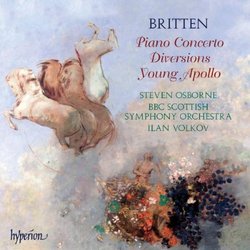| All Artists: Benjamin Britten, Ilan Volkov, Glasgow BBC Scottish Symphony Orchestra, Steven Osborne Title: Britten: Piano Concerto; Diversions; Young Apollo Members Wishing: 1 Total Copies: 0 Label: Hyperion UK Original Release Date: 1/1/2008 Re-Release Date: 9/9/2008 Album Type: Import Genres: Special Interest, Classical Styles: Chamber Music, Forms & Genres, Concertos, Instruments, Keyboard, Symphonies Number of Discs: 1 SwapaCD Credits: 1 UPC: 034571176253 |
Search - Benjamin Britten, Ilan Volkov, Glasgow BBC Scottish Symphony Orchestra :: Britten: Piano Concerto; Diversions; Young Apollo
 | Benjamin Britten, Ilan Volkov, Glasgow BBC Scottish Symphony Orchestra Britten: Piano Concerto; Diversions; Young Apollo Genres: Special Interest, Classical |
Larger Image |
CD Details |
CD ReviewsPassionate Performances D. A Wend | Buffalo Grove, IL USA | 02/16/2010 (5 out of 5 stars) "Benjamin Britten's Piano Concerto was composed in 1938 and was performed during the Proms. The concerto is in four movements. The concerto is unconventional in the movement titles: Toccata, Waltz, Impromptu and March. The original third movement was titled Recitative and Aria but was replaced by the composed in 1945 with the current third movement (also recorded here).
The Toccata is brimming with youthful energy. The movement is also fast until the cadenza is encountered where the soloist is allowed to relax the pace and takes on a more reflective tone. The movement picks up the former tempo and ends with a flourish. The Waltz movement is somewhat dark in tone after a light-hearted beginning. The music become more of an inescapable whirlpool like Ravel's La Valtz then resumes its former calmness before some uneasy shadows creep back in. The Impromptu has a dreamy atmosphere. One of the melodies has a kind of Spanish influence in the rhythm. The movement reaches a dramatic climax, and then settles back to the reflective music of the beginning. The March is satirical akin to Prokofiev's early music. The main melody is played by the piano punctuated by bass drum and cymbals. The music quotes music from the Toccata and a brief passage from the Waltz, and then rejoins the March melody. The concerto ends with a brilliant passage for soloist and orchestra. The Recitative and Aria is a reflective movement that also has a dance-like second subject. Perhaps Benjamin Britten though it too similar to the Waltz movement and so eventually cut it. The movement has a dreamy ending, just fading away. Young Apollo is scored for string quartet, string orchestra and piano; it was written for the Canadian Broadcast Corporation in 1939 as a fanfare. The title refers to a poem by Keats and the music reflects the radiance of the Sun god. Diversions was written in 1940 for the pianist Paul Wittgenstein who commissioned worth for the left hand after loosing his right arm during World War I. The work is laid out as a series of etudes for piano and orchestra. Rather than make the left hand sound like two, as Ravel did with his concerto for Wittgenstein, Britten writes for one hand. The work has some demanding writing for the soloist and explores virtuosic writing for a single hand. I have had the composer's recording of the Piano Concerto with Sviatoslav Richter; it is interesting that this recording by the BBC Scottish Symphony Orchestra is faster. Steven Osborne gives a fantastic performance, particularly in the Toccata where he seems to traverse the keyboard at lightening speed. The orchestra is up to the challenge of the music and performs superbly. This record, however, does not supplant the one by Britten but will occupy a place next to it. " |
